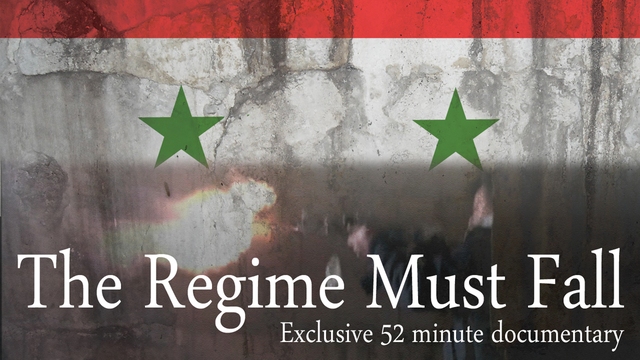Group after group of uniformed Syrian troops proudly display their ID cards as they defect to the Free Syrian Army. This is the inside story of the Syrian uprising, from the kids brutally beaten for challenging the regime to the soldiers stories of the terrible events that lead them to defect. This striking documentary presents a unique insiders' view of a collapsing nation. A shocking and definitive film skilfully blending original footage and dramatic phone recorded images from the front-line.
The regime realised the effect its brutality would have on the Syrian army and did its best to control the information they got.
"We weren't allowed to watch TV and our phones were confiscated for fear we might hear something from relatives", sergeant Mohymen says.
They Syrians turned protesters into terrorists,
"you'd find yourself in front of the TV, watching violent scenes attributed to terrorists. As a soldier you felt you were being challenged, that your time had come." The ordinary troops were told that it was kill or be-killed on the streets and that they must act without pity. But some soldiers saw through the propaganda,
"We were hitting our own people." Instead the soldiers quietly started giving information to demonstrators and acting as 'infiltrators for the revolutionaries', until they eventually defected. Now there is a legion of soldiers under former general Ryad Musa Ass'ad.
"We will work hand in hand with the people for freedom and dignity, for the overthrow of the regime".
The brutality the regime hoped would stifle resistance, instead helped to start the uprising.
"They were tortured, their nails were taken out ... you couldn't believe a human being could do this to a kid, so the people in Dara'a decided this must end." Hamzeh tells us as we watch images of the tortured and beaten kids and the defected soldiers remember the events that finally persuaded them to forever leave the Syrian forces.
Freedom 4566 devoted itself to bringing the truth about the uprising to the outside world. They filmed everything.
"He was filming what the soldiers were doing, how they use violence and he was arrested. They made him confess to things he hadn't done." Nazeer recounts his dead brother's story. The regime was determined to stop people filming the army's actions. A soldier's gun lifts and points at the camera, then the camera stops working, it's lens pierced by a bullet.
"Snipers came out of the post office behind us and started shooting at us. Their targets were anyone with a video camera or a mobile phone."
On Syria's borders many anti-regime groups now operate, providing information and support to those still on the front-lines. Like Nabil, a business owner in Antakya, who with his family supports refugees in a camp nearby.
"There have been about 300 up to now. We try to help them and alleviate their pain..."
As Syria descends into civil war, this film powerfully offers a cross-section of those at war with their own government.
LEARN MORE.
WATCH MORE.
JOIN THE DISCUSSION.
 Group after group of uniformed Syrian troops proudly display their ID cards as they defect to the Free Syrian Army. This is the inside story of the Syrian uprising, from the kids brutally beaten for challenging the regime to the soldiers stories of the terrible events that lead them to defect. This striking documentary presents a unique insiders' view of a collapsing nation. A shocking and definitive film skilfully blending original footage and dramatic phone recorded images from the front-line.
Group after group of uniformed Syrian troops proudly display their ID cards as they defect to the Free Syrian Army. This is the inside story of the Syrian uprising, from the kids brutally beaten for challenging the regime to the soldiers stories of the terrible events that lead them to defect. This striking documentary presents a unique insiders' view of a collapsing nation. A shocking and definitive film skilfully blending original footage and dramatic phone recorded images from the front-line.


